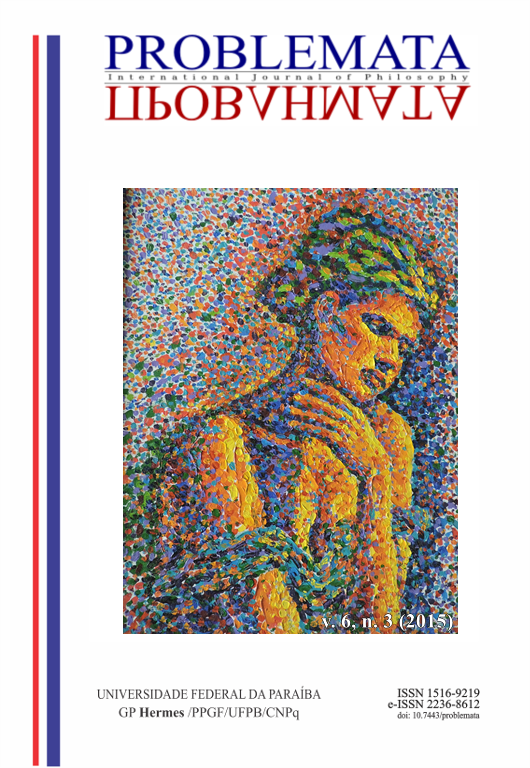QUESTÃO DO CONHECIMENTO - ALGUNS ELEMENTOS FUNDAMENTAIS
DOI:
https://doi.org/10.7443/problemata.v6i3.24389Keywords:
conhecimento, sujeito e objeto, teorias do conhecimento,Abstract
O texto indica alguns dos problemas fundamentais do conhecimento, tal como eles se constituem na tradição, desde os gregos. Mostra que as discussões em torno da validade ou não de um conhecimento assentam sobre a dicotomia sujeito e objeto, mente e mundo. Iniciando pelos gregos, enfoca principalmente a forma com Platão desenvolve a reflexão sobre o conhecimento como crença verdadeira justificada, passando pelas teorias sobre as possibilidades e limites elaboradas durante a modernidade. Aponta a dificuldade das teorias enquanto tentativas de superar o abismo que se estabeleceu entre sujeito e objeto, entre mente e o mundo.
[doi:HTTP://dx.doi.org/10.7443/problemata.v6i3.24389]
Downloads
References
BLACKBURN, Simon. Verdade: um guia para perplexos. Rio de Janeiro: Civilização Brasileira, 2006.
CHRISHOLM, Roderick M. Teoria do Conhecimento. Rio de Janeiro: Zahar Editores, 1969.
COSTA, Claudio. Uma introdução contemporânea à filosofia. São Paulo: Martins Fontes, 2002.
DANCY, Jonathan. Epistemologia Contemporânea. Lisboa: Edições 70, 1985.
DETEL, Wolfgang. Erkenntnis- und Wissenschaftstheorie. Stuttgart: Reclam, 2007.
GILES, Th. Ramson. Ramos fundamentais da filosofia: Lógica, Teoria do Conhecimento, Ética e Política. São Paulo: EPU, 1995.
HEIDEGGER. Ser y Tiempo. Chile: Editorial Universitária, 1998.
KANT. Crítica da Razão Pura. São Paulo: Ed. Nova Cultural Ltda, 1999.
LHANO, Alejandro. Gnosiologia Realista. São Paulo: Instituto Brasileiro de Filosofia e Ciência ‘Raimundo Lúlio’, 2004.
NAGEL, Thomas. Visão a partir de lugar nenhum. Trad. Silvana Vieira. São Paulo: Martins Fontes, 2004.
PIEPER, Annemarie (org.). Philosophische disziplinen – ein Handbuch. Leipzig: Reclam Verlag, 2004.
PLATÃO. Teeteto – Crátilo. Trad. Carlos A. Nunes. Belém: EDUFPA, 2001.
SCHNEIDERS, Werner. Wieviel Philosophie braucht der Mench? Köln: Anaconda Verlag GmbH, 2007.
Downloads
Published
Issue
Section
License
Authors who publish with this journal agree to the following terms:
- Authors retain copyright and grant the journal right of first publication with the work simultaneously licensed under a Creative Commons Attribution License that allows others to share the work with an acknowledgement of the work's authorship and initial publication in this journal.
- Authors are able to enter into separate, additional contractual arrangements for the non-exclusive distribution of the journal's published version of the work (e.g., post it to an institutional repository or publish it in a book), with an acknowledgement of its initial publication in this journal.
-
- Authors are permitted and encouraged to post their work online (e.g., in institutional repositories or on their website) prior to and during the submission process, as it can lead to productive exchanges, as well as earlier and greater citation of published work (See The Effect of Open Access).





